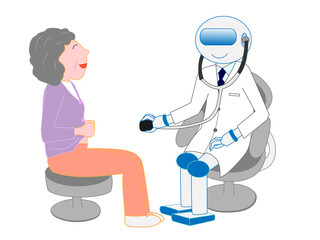Brexit aside, one of the most interesting and fundamental areas for investment in the coming year is the convergence of AI and the NHS, of artificial intelligence and the healthcare sector.
AI/robotics/machine learning are magnificent enablers within this industry and are consequently going to be massively important area for investors. This leads us to ask a question: Why is AI converged with healthcare so important? We might also ask: how is AI revolutionising the NHS and how will further investment into healthcare change the way we regard global healthcare?
AI and machine learning needed to improve the healthcare industry
Artificial intelligence and machine learning can help organise the large amount of data stored within the healthcare industry. And, turn a hinderance into an opportunity
The NHS is the lifeblood of the UK but has been placed under huge financial strain in recent years. It is an extraordinary database which has tracked the majority of UK citizens from birth and thus the data it stores are invaluable.
However, the healthcare sector is an interesting arena: there is a desperate need for AI to modernise its more traditional methods, but this presents unique challenges in its implementation. As the majority of patient’s files are handwritten, this has many drawbacks as the fragmentation of information within the copywritten system frequently hinders both the efficiency of the system and the heath of patients. In addition to this, having handwritten documents is hugely problematic for implementing AI technologies. Despite these initial operational challenges that the medical sector will need to address, the progression of any and all industries will require these adaptations to technologically advance.
Laying the foundations to future-proof our NHS and power UK HealthTech
The adoption of AI within this arena has been incredibly slow given its value as aforementioned, non-existent data repositories, out of date computer technology has hindered its access into the sector. To implement technology at this scale is a huge task that requires a significant amount of time and capital investment. Within the UK, the Government has announced the support of AI and data in early diagnosis, innovation, prevention and treatment a priority, ensuring that the UK’s position as a global tech leader is ensured by 2030. Further capital investment within this sector, in addition to Governmental support, is vital in ensuring that the NHS can reach this deadline and remain technologically savvy. The UK’s investor arena has noted AI converged with healthcare as a core area of capital funding for 2019 and thus, the increased funding within this arena is set to increase the pace of technological developments.
In spite of all the aforementioned issues surrounding the implementation of AI within this arena, it is vital to assess the AI scientific breakthroughs that has revolutionised an array of medical issues worldwide. The NHS and Imperial College London are now able to use Skin Analytics to identify early signs of skin cancer using image analysis; we are able to use AI to detect heart disease in addition to having developed a tool that can now pick out DNA mutations in cancer cells to predict how the cancer might spread. It is undeniable to see the positive impact that AI is having, not only in the organisational aspect of the NHS but also in the efficiency and practice of medicine.
AI in healthcare: Can AI solve the health tech puzzle of new drug discovery?
As the technology is forever advancing within this arena, and 2019 is set to be the year of increased investments, both private and governmental, we hope to see a reduction in the difficulties many start-ups face in scaling their technologies into the healthcare industry. It has been mentioned that the responsibility for innovation with healthcare too often falls upon external investors, however, whilst we need to ensure that the NHS has the resources, desire and infrastructure to support AI, financial support should never be an obstacle to innovation.
Jenny Tooth’s is the CEO of UK Business Angels Association










